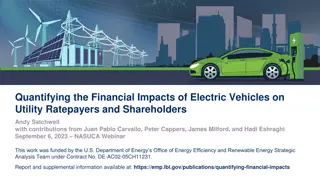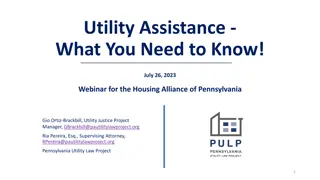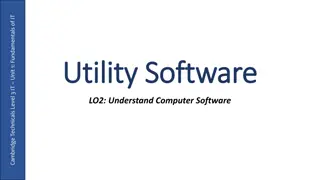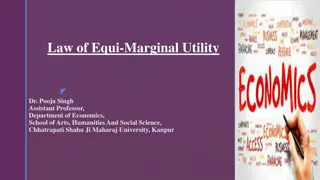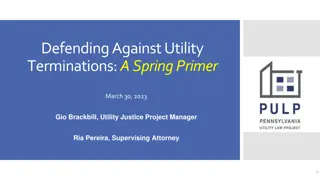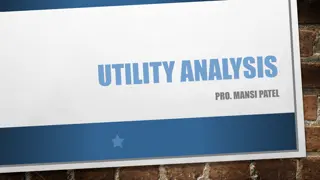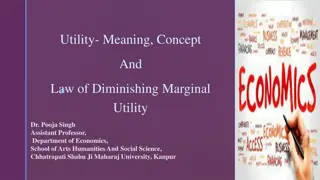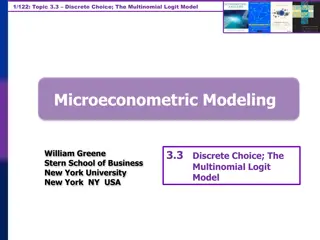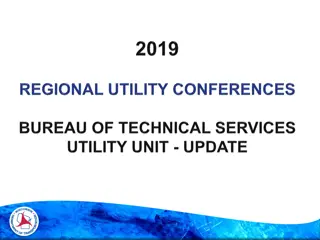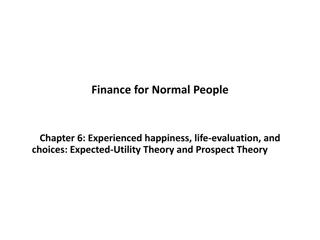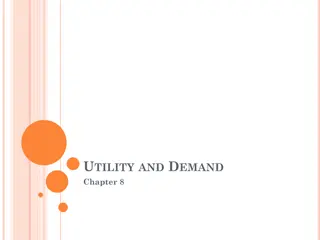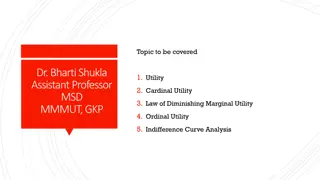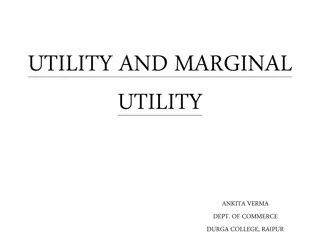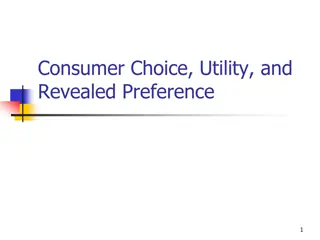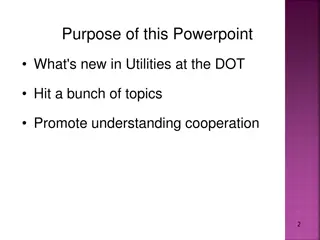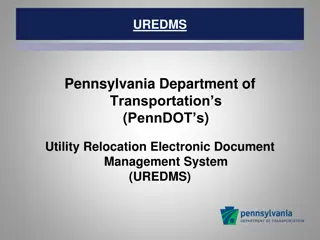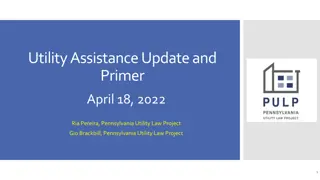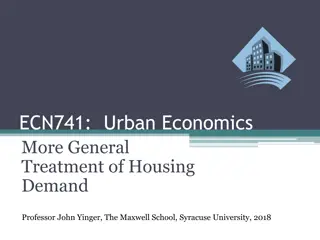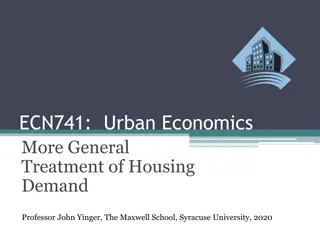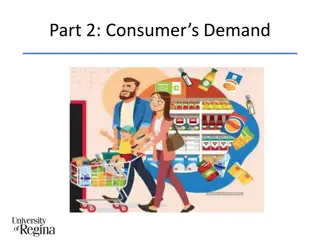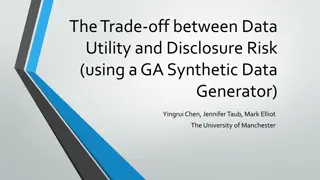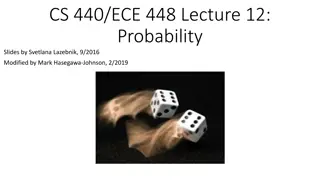Financial Impacts of Electric Vehicles on Utility Ratepayers and Shareholders
Analysis funded by the U.S. Department of Energy examines the effects of electric vehicle adoption on utility finances, including ratepayer and shareholder impacts. The study delves into customer EV adoption, utility revenue collection, and investment value. Various charging strategies and utility c
0 views • 21 slides
Understanding Utility Assistance and Support in Pennsylvania
Gain insights into utility assistance initiatives in Pennsylvania through the perspective of the Pennsylvania Utility Law Project. Topics covered include regulated vs. unregulated utilities, affordability issues, tenant protections, and the impact of utility insecurity on various aspects of life. Di
1 views • 32 slides
Evolution of Mathematical Theories and Proof Systems
Development of mathematical theories such as model theory, proof theory, set theory, recursion theory, and computational complexity is discussed, starting from historical perspectives with Dedekind and Peano to Godel's theorems, recursion theory's golden age in the 1930s, and advancements in proof t
2 views • 29 slides
Understanding Utility Software in IT Systems
Utility software plays a crucial role in maintaining and configuring computer systems. This unit focuses on key utility software types like defragmentation, backups, compression, anti-virus, and encryption. Understanding the purpose, features, advantages, and disadvantages of utility software is ess
0 views • 9 slides
Psychological Theories of Criminality: Understanding the Roots
Psychological theories of criminality delve into the association between intelligence, personality, learning, and criminal behavior. Major theories include Psychodynamic Theory by Freud, Behavioral Theory by Bandura, and Cognitive Theory by Kohlberg. These theories explore how unconscious mental pro
1 views • 20 slides
Understanding the Law of Equi-Marginal Utility in Economics
Law of Equi-Marginal Utility, propounded by Hermann Heinrich Gossen, explains how consumers distribute their income among different goods to maximize satisfaction. It involves equalizing the marginal utility per unit of money spent across various goods. The law is based on the assumptions of rationa
0 views • 8 slides
Defending Against Utility Terminations: A Spring Primer
The Pennsylvania Utility Law Project (PULP) provides assistance and advice on residential utility and energy matters for low-income consumers, aiming to ensure equitable access to affordable utility services. PULP offers direct representation, utility assistance program design, and technical assista
1 views • 47 slides
Understanding the Theory of Firms: Neoclassical vs. Modern Approaches
The theory of firms is explored through the Neoclassical and Modern perspectives. Neoclassical theory focuses on profit maximization, while Modern theory delves into managerial, principal-agent, and transaction cost theories. The discussion covers criticisms of Neoclassical theory and the essential
1 views • 79 slides
Understanding Utility: Marginal vs. Total Utility
Utility in economics is the satisfaction derived from consuming goods or services. Marginal utility measures the change in total utility as consumption increases, whereas total utility is the sum of satisfaction obtained from consuming different units of a commodity. Consumers aim to maximize total
2 views • 11 slides
Understanding Utility: Meaning, Concept, and Law of Diminishing Marginal Utility
Utility is the satisfaction or well-being a consumer derives from consuming goods or services. Total utility is the sum of satisfactions, while marginal utility is the additional satisfaction from one more unit consumed. Utility can be measured and ranked but not numerically. The Law of Diminishing
3 views • 9 slides
Microeconometric Modeling with Multinomial Logit Model
The topic discusses the Multinomial Logit Model in the context of discrete choice modeling, covering concepts, models, consumer preferences, utility maximization, and implications for discrete choice models. It explores how consumers maximize utility under budget constraints, the need for well-defin
1 views • 58 slides
Theories of Causation in Psychological and Social Sciences
Overview of theories of causation categorized into psychological, social psychological, and sociological perspectives. Psychological theories focus on instinctive, biological, and psychological qualities of abusers, including Attachment Theory, Psychodynamic Theory, Social Learning Theory, and Situa
0 views • 15 slides
WisDOT Utility Coordination Efforts for Statewide Projects
WisDOT is testing new processes using DocuSign for utility coordination in statewide projects, aiming to streamline procedures and reduce over-processing. Shane Smith and Dylan Gates are leading the testing phase with utility companies to gather feedback and improve the system. The team's goal is to
5 views • 20 slides
Understanding Expected-Utility Theory and Prospect Theory in Finance
Explores the concepts of experienced happiness and life evaluation through Expected-Utility Theory and Prospect Theory. Discusses how individuals perceive wealth changes differently based on these theories, impacting their emotional well-being and overall life satisfaction. Delve into the distinctio
0 views • 43 slides
Understanding Political Theory through a Contextual Approach
Exploring G.H. Sabine's perspective on political theory through a contextual approach, emphasizing the importance of historical context and societal influences. Sabine argues that while political theory evolves with its contemporary politics, it should be analyzed within its specific time and social
0 views • 9 slides
Evolution of Light Theory: From Wave Theory to Quantum Theory
At the turn of the century, the discovery of the photoelectric effect challenged the wave theory of light, leading to the development of the quantum theory by Max Planck and Albert Einstein. This new theory introduced the concept of discrete energy units known as quanta, bridging the gap between wav
2 views • 62 slides
Dp-branes, NS5-branes, U-duality, and M-Theory Overview
Overview of Dp-branes, NS5-branes, and U-duality derived from nonabelian (2,0) theory with Lie 3-algebra. Introduction to M-theory, including M2-branes and M5-branes in the strong coupling limit. Discussion on BLG theory, Lorentzian Lie 3-algebra, and the ABJM theory for M2-branes.
1 views • 32 slides
Understanding Consumer Choices and Utility Maximization
Exploring how consumers make consumption decisions based on utility theory, marginal utility, and preferences. Analyzing Lisa's consumption possibilities, total utility, and marginal utility to illustrate economic concepts. Discussing the utility-maximizing rule for optimal decision-making in spendi
0 views • 22 slides
Understanding Utility Theory in Economics
Utility theory in economics explores the concept of utility, which refers to the satisfaction or want-satisfying capacity a commodity provides to consumers. It is subjective, relative, and can vary among individuals. Cardinal utility analysis quantifies utility in numbers, while total utility and ma
3 views • 13 slides
Understanding Time-Independent Perturbation Theory in Quantum Mechanics
Perturbation theory is a powerful tool in solving complex physical and mathematical problems approximately by adjusting solutions from a related problem with known solutions. This theory allows for more accurate approximate solutions by treating the difference as a small perturbation. An example inv
0 views • 19 slides
Ethical Theories: Divine Command vs. Virtue Theory Explained
Divine Command Theory asserts that morality is derived from God's commands, contrasting with Virtue Theory which focuses on developing moral virtues to achieve human flourishing and excellence. Divine Command Theory relies on religious texts, while Virtue Theory emphasizes the cultivation of virtues
0 views • 24 slides
Understanding Utility and Marginal Utility in Economics
Utility refers to the satisfaction a consumer receives from consuming commodities. It is a subjective concept that can be measured through cardinal or ordinal approaches. Cardinal approach involves measuring utility numerically, while ordinal approach orders levels of satisfaction based on utility.
0 views • 16 slides
Understanding Fermi Liquid Theory in Interacting Fermion Systems
Fermi liquid theory, also known as Landau-Fermi liquid theory, is a theoretical model that describes the normal state of metals at low temperatures. Introduced by Landau and further developed by Abrikosov and Khalatnikov, this theory explains the similarities and differences between interacting ferm
0 views • 23 slides
Understanding Consumer Choice and Utility Theory
Explore the concepts of consumer choice, utility, and revealed preference in economics. Learn how utility functions help us rank the desirability of consuming different bundles of goods. Discover the mathematical representation of utility and see examples of representing utility in terms of goods co
0 views • 69 slides
Enhancing Utility Coordination for DOT Projects in Iowa
This PowerPoint presentation delves into the key aspects of utility coordination for Department of Transportation (DOT) projects in Iowa. Covering topics such as Buy America regulations, lane restriction notifications, utility accommodation policies, and coordination methods, the presentation aims t
0 views • 17 slides
FHWA Utility Relocation and Accommodation Guidelines Summary
This document provides detailed information on the FHWA Utility Relocation and Accommodation Guidelines, including relevant Kentucky Revised Statutes (KRS) such as KRS 416.360 and federal regulations like 23 CFR 645.107 and 23 CFR 645.111. It discusses the acquisition of real property for public uti
0 views • 11 slides
PennDOT UREDMS - Utility Relocation Electronic Document Management System
PennDOT's UREDMS (Utility Relocation Electronic Document Management System) is an electronic document management system used for utility relocations. It functions as a virtual filing cabinet, allowing for easier search, faster retrieval, and better revision control of important documents. The system
1 views • 15 slides
Utility Assistance Update and Primer - PULP Focus on Low-Income Residential Utility in Pennsylvania
Today's webinar presented by Pennsylvania Utility Law Project (PULP) focused on LIHEAP programs, tools for preventing termination, and special protections for utility customers. It covered the Winter Moratorium ending, LIHEAP basics, eligibility criteria for cash grants, and more to assist low-incom
0 views • 50 slides
Computational Learning Theory: An Overview
Computational Learning Theory explores inductive learning algorithms that generate hypotheses from training sets, emphasizing the uncertainty of generalization. The theory introduces probabilities to measure correctness and certainty, addressing challenges in learning hidden concepts. Through exampl
0 views • 43 slides
Automata Theory and Theory of Computation Overview
This course overview covers concepts in automata theory and theory of computation, including formal language classes, grammars, recognizers, theorems in automata theory, decidability, and intractability of computational problems. The Chomsky hierarchy, interplay between computing components, modern-
0 views • 42 slides
Efficient Top-k Query Processing Using Probabilistic Utility Functions
This paper presents a method for determining which cars to display on an online car selling service based on users' utility functions. It explores the use of probabilistic utility functions to identify cars that users would be interested in, addressing limitations of traditional top-k and skyline qu
0 views • 28 slides
Standardization of Utility Bid Items for Road Contracts
Efforts within District 6 to standardize and streamline utility bid items and descriptions for road contracts, including historical context, past initiatives, and collaboration with various utility owners. The goal is to enhance clarity and consistency in bid requirements across projects, making it
0 views • 16 slides
Theories of Interest in Microeconomics II
Explore various theories of interest in economics, including the Classical Theory, Liquidity Preference Theory by Keynes, Productivity Theory, Abstinence Theory, Time-Preference Theory, Fisher's Time Preference Theory, and the Loanable Fund Theory. These theories offer different perspectives on the
1 views • 6 slides
Exploring the Evolution of Atomic Theory
Delve into the historical journey of atomic theory starting from Democritus and Aristotle's views to modern advancements proving some aspects of Dalton's theory incorrect. Learn about key laws and theories such as the Particle Theory of Matter, Dalton's Atomic Theory, and JJ Thomson's discoveries, s
0 views • 30 slides
Understanding Housing Demand Theory in Urban Economics
Explore the nuances of housing demand theory in urban economics, covering topics such as alternative utility functions, exponential density functions, maximizing bid functions, and comparative statics. Delve into Stone-Geary and CES utility functions, their implications on demand functions, and the
0 views • 35 slides
Understanding Housing Demand Theory and Utility Functions in Urban Economics
Explore the concepts of housing demand theory, alternative utility functions, Stone-Geary utility function, CES utility function, and comparative statics in urban economics. Discover how these theories impact housing demand and pricing strategies.
0 views • 38 slides
Understanding Consumer Demand: From Utility Theory to Behavior in the Marketplace
We delve into the relationship between utility theory and consumer demand, exploring how individuals' tastes, preferences, and budget constraints influence their choices. Through examples like Neal's decision between snowboarding and jazz, we see how utility translates into demand curves, guiding co
0 views • 17 slides
Macromechanical Analysis of Lamina and Tsai-Hill Failure Theory Overview
The Tsai-Hill failure theory is based on the strengths of a unidirectional lamina, incorporating longitudinal and transverse tensile and compressive strengths, as well as in-plane shear strength. This theory, derived from the distortion energy theory, provides criteria for determining lamina failure
0 views • 15 slides
Understanding the Trade-off between Data Utility and Disclosure Risk
This study explores the balance between data utility and disclosure risk using a GA synthetic data generator. The authors delve into measuring utility and risk, emphasizing structured categorical data. They define synthetic data, discuss utility assessment methods, and outline how to measure data ut
0 views • 30 slides
Understanding Probability and Decision Making Under Uncertainty
Probability theory plays a crucial role in decision-making under uncertainty. This lecture delves into key concepts such as outcomes, events, joint probabilities, conditional independence, and utility theory. It explores how to make decisions based on probabilities and expected utility, highlighting
0 views • 34 slides
